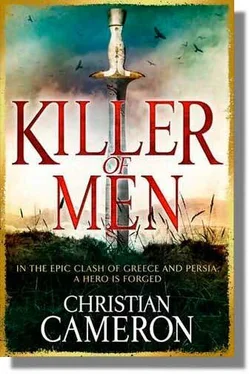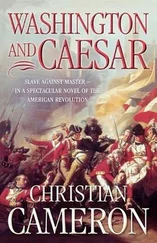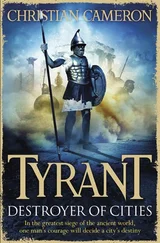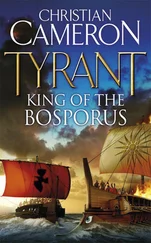Christian Cameron - Killer of Men
Здесь есть возможность читать онлайн «Christian Cameron - Killer of Men» весь текст электронной книги совершенно бесплатно (целиком полную версию без сокращений). В некоторых случаях можно слушать аудио, скачать через торрент в формате fb2 и присутствует краткое содержание. Жанр: Исторические приключения, на английском языке. Описание произведения, (предисловие) а так же отзывы посетителей доступны на портале библиотеки ЛибКат.
- Название:Killer of Men
- Автор:
- Жанр:
- Год:неизвестен
- ISBN:нет данных
- Рейтинг книги:4 / 5. Голосов: 1
-
Избранное:Добавить в избранное
- Отзывы:
-
Ваша оценка:
- 80
- 1
- 2
- 3
- 4
- 5
Killer of Men: краткое содержание, описание и аннотация
Предлагаем к чтению аннотацию, описание, краткое содержание или предисловие (зависит от того, что написал сам автор книги «Killer of Men»). Если вы не нашли необходимую информацию о книге — напишите в комментариях, мы постараемся отыскать её.
Killer of Men — читать онлайн бесплатно полную книгу (весь текст) целиком
Ниже представлен текст книги, разбитый по страницам. Система сохранения места последней прочитанной страницы, позволяет с удобством читать онлайн бесплатно книгу «Killer of Men», без необходимости каждый раз заново искать на чём Вы остановились. Поставьте закладку, и сможете в любой момент перейти на страницу, на которой закончили чтение.
Интервал:
Закладка:
But it was his eyes that held me. He had green eyes – as I do myself – and I'd never seen another pair. They also had a particular quality – they seemed to look through you to a place far beyond.
I know, dear. My eyes do the same. But they didn't then.
I don't think most of the farmers of the valley of the Asopus knew what Calchas was. They thought him a harmless priest, a drunk, a useful old man who would teach their sons to read.
It is almost funny, given what Plataea was to become, that in all the valley, there wasn't a man hard enough to look the priest in the eye and see him for what he was.
A killer. I lived with Calchas for years, but I never thought of his hut beside the spring and the tomb as home. From the edge of the tomb I could see our hill rising thirty stades away, and when I was homesick I would climb the round stones to the top, lie on the beehive roof and look across the still air to home. And often enough he would send me back on errands – because we paid him in wine and olive oil and bread and cheese, and because he was a kind man for all that his eyes were dead. He'd wait until I cried myself to sleep a few nights, and then he'd send me home on an errand without my asking.
That whole first autumn, I learned my letters and nothing else. For hours every day, and then we'd scour his wooden dishes and his one bronze pitcher, a big thing that had no doubt been a donation in the ancient past. He didn't speak much, except to teach. He simply taught me the letters, over and over again, endlessly patient where Pater would have been screaming in frustration.
I'd like to say that I was a quick learner, but I wasn't. It was early autumn, and everything was golden, and I was an outdoor boy caught in his lessons. I wanted to watch the eagles play in the high air, and the woods around the shrine fascinated me, because they were so deep and dark. One day I saw a deer – my first – and then a boar.
I felt as if I had fallen into the land of myth.
Travellers sometimes came over the mountain to the shrine. Not many, but a few. They were always men, and they often carried weapons, a rare sight down in the valley. Calchas would send me away, then he'd sit with the men and drink a cup of wine.
They were soldiers, of course. Soldiers came to the shrine from all over Boeotia, because the word was that the shrine and the spring provided healing to men of war. I think it was Calchas who healed them. He talked and they listened, and they went away lighter by a few darics and some care. Sometimes he'd get drunk afterwards, but mostly he'd go and say some prayers at the shrine of the hero, and then he'd make us some barley gruel.
His food was terrible, and always the same – black bread, bean broth without meat, water. I've lived in a Spartan mess group and eaten better. At the time I cared little. Food was fuel.
Calchas had fascinating things in his hut. He had an aspis as fine as Pater's – a great bowl of bronze and wood, with a snake painted in red and a hundred dents in the surface. He had a sword – a long sword with a narrow blade, nothing like Pater's long knife. He had a dull helmet – a simple one, not a fancy Corinthian like Pater's – and his cuirass consisted of layers of white leather scarred and scuffed and patched a hundred times without a scrap of bronze to brighten it. He had a fine hunting spear, beautifully made by a master, with a long tapering point of steel, chased and carefully inlaid in the Median style, and a bow of foreign work with a quiver of arrows.
He was content to let me touch it all, which I was never allowed with Pater's kit. All except the bow.
So naturally, I had to steal the bow.
It wasn't hard. His hut had one piece of ornamentation – a window made from panes of horn pressed thin and flat. It let light in, in the winter, and it was beautifully crafted, the gift of some rich patron. It was made to pivot on a pair of bronze pintles cunningly fashioned. Calchas used to laugh about it. He called it the 'Gate of Horn' and said all his dreams came through it – and he also called it the 'Lord's Window'. 'A foolish thing to have in a peasant's hut,' he said, although that window alone allowed me to read in the winter.
I had soon learned that I could get in and out of that window. I whittled a stick with my sharp iron knife so that I could prise the window open from outside. I waited till he was drunk, then got in and took the bow and quiver and ran off up one of the hundreds of paths that led from the clearing by the spring. I found my way to a small meadow with an old stump, spotted on an earlier ramble, and my adventure came to an end when I tried to string the bow. I spent the afternoon striving against the power of a man's weapon and I failed.
So I carried the bow and quiver back down the mountain and sneaked them into his hut, returning the bow to the peg where it hung.
After lessons the next day, I said, 'Master, I took your bow.'
He was putting away the stylus and the wax sheets he made. He turned so fast that I flinched.
'Where is it?' he asked.
'On its peg,' I said. I hung my head. 'I couldn't string it.'
I never saw his hand move, but suddenly my ear hurt – hurt like fire. 'That's for disobedience,' he said calmly. 'You want to shoot the bow?'
'Yes!' I said. I think I was crying.
He nodded. 'I'm sending you for more wine,' he said. 'When you come back, perhaps we'll make a bow you can shoot.' He paused. 'And we'll do the dances. The military dances. Now, what letter is this?' he drew one, and I said 'Omicron.'
'Good boy,' he said.
My ear still hurt, all thirty stades home. My brother was working in the forge, and he didn't like it. It's odd, being brothers. We were alike in so many ways – and we were always friends, even when we were angry – but we wanted different things. He wanted to be a warrior, a nobleman with a retinue and deer hounds. He wanted the life Mater wanted for him. And all I wanted to be was a master smith. Irony is the lord of all, honey. I got what he wanted, and he got a few feet of dirt. But he was a good boy, and he was in the forge doing the job that I would have sold my soul to do. That's the way of it when you are young.
I showed Mater my letters and sang her the first hundred lines of the Iliad, which Calchas had also taught me, and she nodded and kissed my cheek and gave me a silver pin.
'At least one of my sons will grow up a gentleman,' she said. 'Tell me of this Calchas.'
So I did. I told her all I knew about him, which proved, under her Medusa-like glare, to be little enough. But she smiled when I said he ate black bread and bean soup.
'An aristocrat, then,' she said happily. Not my idea of an aristocrat, but Mater knew some things better than her eight-year-old child.
I stayed at home for two days while Pater gathered some wine. I helped in the forge and saw that my brother had already learned a few things. He'd made a bowl from copper and he was scribing it with a stylus – just simple lines, but to me it looked wonderful.
He pulled it from my hand, threw it across the forge and burst into tears. And we embraced, and swore to swap when Pater and Calchas wouldn't know. It wasn't an oath either of us meant – we knew we'd never fool an adult – and yet it seemed to comfort us, and I've long wondered about which god listened to that oath.
There were changes. Mater was better – that was obvious. The house was clean, the maids were singing and my sister smiled all the time. We had a new slave family – a young man, a Thracian, and his slave wife and their new baby. He didn't speak much Greek, and Bion didn't like him, and the man had a big bruise on his face where someone had knocked him down hard. His wife was pretty, and men in the forge yard watched her when she served them wine. Not that Pater allowed anything to happen. That's where you really betray your slaves, thugater. But I get ahead of myself.
Читать дальшеИнтервал:
Закладка:
Похожие книги на «Killer of Men»
Представляем Вашему вниманию похожие книги на «Killer of Men» списком для выбора. Мы отобрали схожую по названию и смыслу литературу в надежде предоставить читателям больше вариантов отыскать новые, интересные, ещё непрочитанные произведения.
Обсуждение, отзывы о книге «Killer of Men» и просто собственные мнения читателей. Оставьте ваши комментарии, напишите, что Вы думаете о произведении, его смысле или главных героях. Укажите что конкретно понравилось, а что нет, и почему Вы так считаете.












